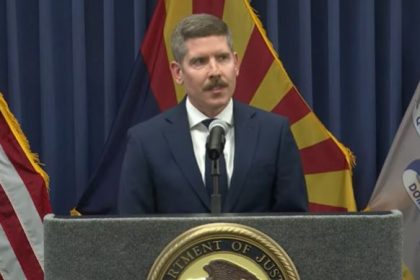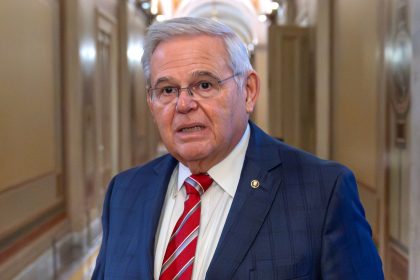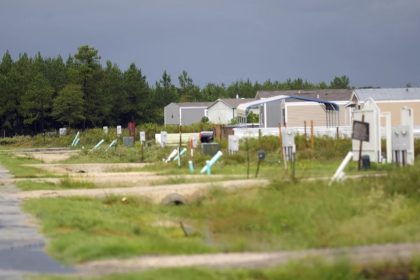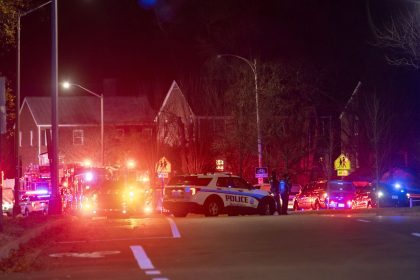Security Agencies Warn of Violence Leading Up to Midterm Elections

WASHINGTON — U.S. security agencies are on heightened alert this week approaching the midterm elections on Nov. 8.
The Department of Homeland Security issued a bulletin after Paul Pelosi, the husband of House Speaker Nancy Pelosi, D-Calif., was attacked in their home on Friday and, in a separate incident, a Pennsylvania man pleaded guilty to threatening to kill a member of Congress and his staff.
The Homeland Security Department, along with the FBI, warns in the bulletin that the security risks coincide with a rise in domestic extremism.
Rep. Bennie Thompson, D-Miss., chairman of the House Homeland Security Committee, gave a similar warning when he said in a statement, “Unfortunately, the attack against Paul Pelosi appears to be a symptom of a much larger problem within our democracy. In recent years, we have seen a rise in domestic terrorism fueled in part by violent, racist, antisemitic, anti-democratic rhetoric.”
Some of it is propelled by former President Donald Trump’s claims of election fraud in 2020.
The upcoming midterm elections are headed in the same direction with extremists saying fraud already is undermining the integrity of the vote.
The FBI claims to have intercepted right-wing extremist messages saying the electoral system is “under attack.” The messages included threats of political violence.
Between 2017 and 2021 the number of cases “concerning statements and threats” against members of Congress rose from 3,939 to 9,625, according to the U.S. Capitol Police.
Sen. Susan Collins, R-Maine, whose home in Bangor was vandalized by a man who threw a brick at it, recently warned about the escalating threats.
“I wouldn’t be surprised if a senator or a House member were killed,” Collins said. “What started with abusive phone calls is now translating into active threats of violence and real violence.”
The threats prompted President Joe Biden on Friday to denounce the agitators.
“Every person of good conscience needs to clearly and unambiguously stand up against the violence in our politics regardless what your politics are,” Biden said at the Pennsylvania Convention Center in Philadelphia while endorsing local political candidates.
He used the attack on 82-year-old Paul Pelosi at his home in San Francisco, California, as an example.
A man wielding a hammer broke into Pelosi’s home, hitting and seriously injuring the House speaker’s husband, while shouting, “Where is Nancy?” Nancy Pelosi was in Washington at the time.
Just before the attack, the suspect posted conspiracy theories on Facebook about COVID-19 vaccines, the Jan. 6, 2021, riot at the Capitol and fraud in the 2020 election.
Biden put part of the blame on Republicans who are trying to draw voters for the midterms by repeating Trump’s false claims the 2020 election was stolen from him.
“What makes us think that one party can talk about stolen elections, COVID being a hoax, it’s all a bunch of lies,” Biden said. The rhetoric was likely to “affect people who may not be so well balanced,” he said.
On the same day Paul Pelosi was attacked, a Pennsylvania man pleaded guilty to threatening to kill Rep. Eric Swalwell, D-Calif., and his staff.
He said he had AR-15 rifles, would beat Swalwell and kill three members of his staff.
Previously, Joshua Hall, 22, pleaded guilty to wire fraud for impersonating Trump’s family members on social media to raise money for a fake political organization but planned to keep the money for himself.
The Homeland Security bulletin warned the threat of violence from right-wing extremists could extend to religious minorities and polling stations.
“We assess some [domestic violent extremists] motivated by election-related grievances would likely view election-related infrastructure, personnel and voters involved in the election process as attractive targets — including at publicly accessible locations like polling places, ballot drop-box locations, voter registration sites, campaign events and political party offices,” the bulletin said.
It said by targeting election locations, extremists might hope they are “swaying voting habits, undermining perceptions of the legitimacy of the voting process or prompting a government reaction.”
The FBI responded to an inquiry from The Well News about the heightened state of alert by saying in a statement, “While our standard practice is to not comment on specific intelligence products, the FBI regularly shares information with our law enforcement partners to assist in protecting the communities they serve. The FBI always encourages members of the public to be vigilant and report anything they consider suspicious to law enforcement.”
Tom can be reached at [email protected] and @TomRamstack






















